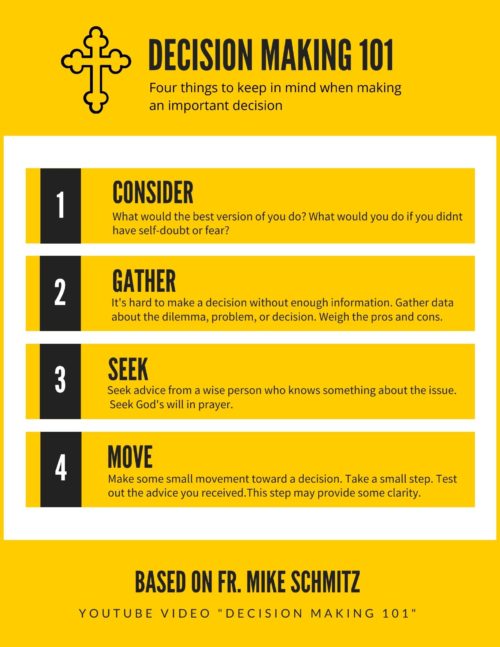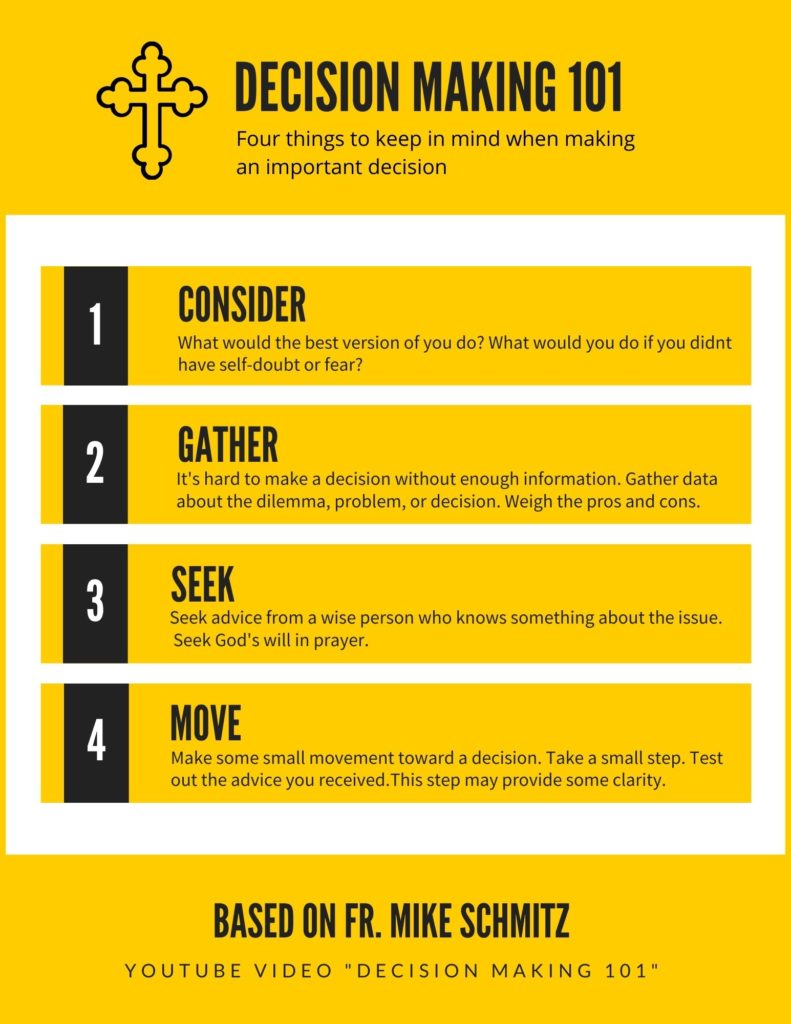In This Series
- Decision Making Tips for Teens (this article)
- When God’s Will Is Unclear
- 4 Doors of Discernment
In the next few months my 17-year-old daughter will need to decide where she will attend college next year. She has narrowed it down to two schools, and she loves both of them. To help her sort through her options, I’m doing some discernment work with her. My two younger kids are joining us, so they get some idea what the decision making process is about. As I’m doing this work with my kids, I’ll share my thoughts and resources if they would be helpful to other families with older kids and teenagers.
In general, parents are the compass point for their children as their children make their way in the world. We provide rules and boundaries for them, and hopefully they use these limitations along with our love to make wise decisions. As they enter the teen years, our teenagers become increasingly responsible for making decisions that will impact their lives: where to go to college, what sort of employment to pursue, whether to choose the married or religious life. We can’t make these decisions for our children, though we can certainly provide guidance.
After looking for resources, I think Fr. Mike Schmitz’s videos on decision making and discernment are a great launching point for discussions about how we go about making good decisions. He has four or five videos on this general topic of discernment. Fr. Mike’s delivery style is appealing for our teens, and he frames things in a way they can comprehend.
I already did an initial talk with my kids where I set the foundation for any decision making: We only need to discern between two morally good choices. If one of the choices is morally wrong, then there’s no discernment work to do. It’s easy for teens to convince themselves that an option is on the table because their friends are doing it or doing it would make them more popular. Of course, they can use their freedom to make a choice they know is wrong or bad for them, and we can’t save them from the consequences if these bad choices. All the more reason to provide some guidance in good decision making!
DISCERNMENT BASICS
The first video I’m sharing with my kids is Fr. Mike’s “Decision Making 101.” He covers four basic points in the video, which I’ve put in this printable handout. I’ve also provided a decision-making prayer on the back:
Here’s an overview. Father Mike recommends that we keep some important things in mind when making a big decision.
1. Consider
When we’re making an important decision, we can become confused because our judgment is clouded by our fears and doubts. Consider: What would the best version of you do? The most faithful version of you? The freest version of you? What would you do if you were not burdened by self-doubt or fears? What would Christ do in this situation?
2. Gather
It’s possible we don’t have enough information about the dilemma, problem, or decision we’re facing. So, we should gather data and information. We can compare the information we find and explore the pros and cons of the options. The data or information isn’t the answer, but it can help us get closer to the answer.
For example, my daughter who is discerning her college was able to narrow down her choices to two colleges after learning about the core requirements and options for majors at the different colleges she was considering.
Sometimes gathering information helps us see that a door is closed to us. One of my children once wanted to work at a craft store, and she was trying to decide whether to apply. So I recommended that she check on their minimum age requirement for employment. It turned out she was too young. Decision made (at least for now)!
3. Seek
We don’t have to face difficult decisions in isolation. We should always seek God’s will in prayer about important decisions, asking that our will be aligned to God’s will for us. When we’re anxious about an important choice, we may be tempted to skip our prayer commitments, but we should actually increase our prayer. Spiritual masters recommend frequent Confession, Adoration, and Mass when discerning. Given Covid restrictions, we have to be flexible, but at the very least we should keep up our daily prayer.
Beyond seeking God’s will, we can seek counsel from somebody we trust. This should be somebody who knows something about the issue we’re facing. Fr. Mike mentions that he wouldn’t be the right person to consult about financial investments. Our teens might want to ask their peers for their advice, which is fine if the teen has relevant experience and information to share. For example, my daughter who is discerning her college could ask to connect with current students at the schools she’s considering.
It’s important that our teenager understands that when seeking advice about an important decision, we can’t give the other person the responsibility for making the decision, but we can ask them for advice, using their insights to further our discernment. Often these advisers offer perspectives or insights we hadn’t considered.
4. Move
For teenagers, I think this is the most important piece of advice that Fr. Mike makes in this video: at some point, take a step forward. Teens can assume they have to know with one hundred percent certainty what to do before they do anything about the decision. This isn’t true. We can take preliminary steps toward a decision. It doesn’t have to be a huge step. It can be a small action to test out the advice we received, or to expose ourselves to what it would be like to live with our decision.
For example, my daughter who is discerning her college attended online webinars at a few of the schools she applied to, and she visited two of them in person. By doing so, she ruled out one school and became more confident about another. Another example: if our teen is discerning a calling to the priesthood or religious life, we can help him arrange a visit with a vocations director in our diocese or with a religious order.
Taking this kind of step is wise because we’re testing the decision without committing ourselves prematurely. We’re doing something even if we’re not sure how it will ultimately turn out. I find that taking these small steps often brings much greater clarity in the decision-making process; it can help us quickly rule out options or realize obstacles or opportunities we hadn’t been aware of previously.


